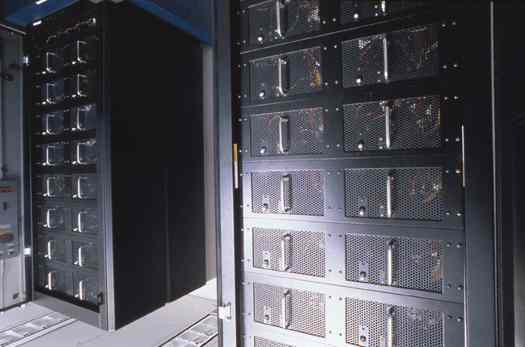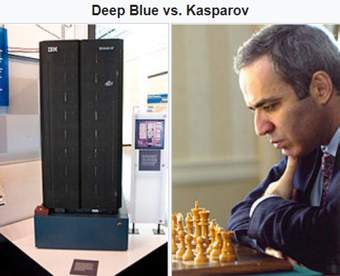| Deep Blue Became World Chess Champion 25 Years Ago |
| Written by Alex Armstrong |
| Sunday, 15 May 2022 |
|
Today is the 25th Anniversary of IBM's chess playing supercomputer Deep Blue beating the reigning world chess champion Gary Kasparov at his own game, marking a milestone in the progress of artificial intelligence. Or was it just a bug? On May 11, 1997 the champion and computer met at the Equitable Center in New York, in front of television cameras and an audience who watched the match on television screens rather than in the studio where it actually took place. The chess grandmaster won the first game, Deep Blue took the next one, and the two players drew the three following games. Game 6 ended the match with a crushing defeat of the champion by Deep Blue.
Deep Blue's program, written in C, ran under the IBM AIX operating system and took a brute-force approach, searching up to 200 million possible chess positions per second and ran on a supercomputer that had been augmented by some special-purpose hardware that accelerated parts of the computation. Specifically, Deep Blue was a 32-node IBM RS/6000 SP high-performance computer, which used IBM POWER2 Super Chip processors, the single-chip implementation of the POWER2 processor. Each node employed a single microchannel card containing eight dedicated VLSI chess processors, for a total of 256 processors working in tandem. In 2012, to celebrate the 15th anniversary IBM produced a video, explaining that the significance of Deep Blue's victory was not simply about the computer's ability to play chess for its own sake but as a demonstration of how to solve a difficult class of problem: IBM's prowess in the field of artificial intellegence came from its superior hardware. Following in the footsteps of Deep Blue, came Blue Gene, which in 2004 was the world's fastest supercomputer, capable of handling 478 trillion operations per second thanks to having 212,992 processors. Then in 2011 IBM's Watson won Jeopardy by virtue of its ability to analyze some 200 million pages of data per second. More recently Google DeepMind has made notable advances in AI starting with playing the ancient Chinese game of Go, with AlphaGo beating its top human players, and then Poker in which DeepStack became the first AI system to beat humans. Just as Deep Blue retired from Chess after beating Kasparov, the AlphaGo computer retired from playing Go after the Future of Go Summit but whereas Deep Mind has repurposed and further developed AlphaGo's neural networks, using it to tackle problems in fields as diverse as physics and biology, Deep Blue was dismantled in 1997 shortly after the victory and before Kasparov demanded a rematch - having discovered that Deep Blue's "superior intelligence" was in fact, due to a bug. Just as Alpha Go played an unconventional game, so did Deep Blue. It was programmed to play standard chess moves and to look typically 6 to 8 moves ahead to give it an advantage over a human player. It also had the advantage of inscrutability. The 1997 match between Kasparov and Deep Blue was a rematch after a first match in 1996 when Deep Blue had won one game of six and drew two others with the result being 4 games to 2 in Kasparov's favor. In the interim Deep Blue's hardware had been upgraded, doubling its speed. Kasparov must have faced the match with some trepidation. So when in the 44th move of the first game a bug in Deep Blue's code led it to enter an unintentional loop, which it exited by taking a randomly-selected valid move, rather than recognizing this as sub-optimal Kasparov interpreted it as Deep Blue's "superior intelligence" and the decline in his performance in the remained of the match may have been due to being spooked by the machine rather than Deep Blue's actual superiority.
In the last few years AI really has advanced to the point where the most powerful computers will always be able to beat, or at least draw, with top human players at Chess, Checker's Go, Poker or any game that involves strategy and information. And Deep Blue's contribution was real, even if flawed. Related articlesWatson wins Jeopardy! - trick or triumph AlphaGo Beats Lee Sedol Final Score 4-1 Why AlphaGo Changes Everything To be informed about new articles on I Programmer, sign up for our weekly newsletter, subscribe to the RSS feed and follow us on Twitter, Facebook or Linkedin.
Comments
or email your comment to: comments@i-programmer.info |
| Last Updated ( Sunday, 15 May 2022 ) |



